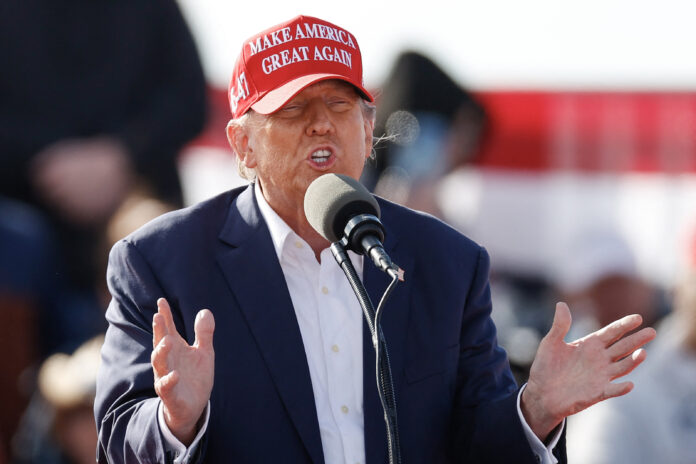Donald Trump is “alienating to large swathes of suburbia,” according to a prominent political scientist speaking after the presumptive Republican presidential nominee performed poorly in a number of suburban areas during his GOP primary campaign.
On March 12, Trump established himself as the presumptive Republican presidential candidate for 2024 with a string of primary victories which gave him enough declared delegates to formally clinch the GOP nomination at the party’s national convention in July.
He secured further primary victories on March 19 in Florida, Ohio, Arizona, Illinois and Kansas. However, in a warning sign for Trump, he lost more than 500,000 votes to Nikki Haley, the former South Carolina governor who had already dropped out of the race and is currently declining to say whether she will endorse the presumptive nominee.
During the primaries, Trump struggled in a number of firmly suburban areas, traditional Republican strongholds which have been drifting away from the party in recent years.
In Arizona’s Maricopa County, which includes the state capital Phoenix, Trump won 77 percent of the GOP primary vote against 20 percent for Haley and two percent for Florida Governor Ron DeSantis, both of whom had already dropped out of the race.
Similarly in Franklin County, Ohio, containing the state capital Columbus, Trump got 70 percent of the vote with Haley once again picking up 20 percent.
For the largely suburban DuPage County in Illinois, just to the west of Chicago, Trump got 72 percent of the vote against 22 percent for Haley.
Reacting to preliminary results from these three counties on X, formerly Twitter, ABC News data analyst G. Elliott Morris posted: “Look, I’m not one to read too much into the voting patterns of the GOP primary; Trump is going to win something like 90-95 percent of Republican voters come November. But even if 10 percent of these suburban Haley voters don’t turn out for him or vote Biden in Nov, that could be the difference.”
Look, I’m not one to read too much into the voting patterns of the GOP primary; Trump is going to win something like 90-95% of Republican voters come November. But even if 10% of these suburban Haley voters don’t turn out for him or vote Biden in Nov, that could be the difference pic.twitter.com/ZA0RmCq4lw
— G Elliott Morris (@gelliottmorris) March 20, 2024
These concerns were echoed by Thomas Gift, a political scientist who heads the Centre on U.S. Politics at University College London, in comments provided to Newsweek.
He said: “Trump is doubtlessly alienating to large swathes of suburbia, which tend have higher concentrations of wealthier and college-educated voters that have broadly turned away from the GOP.
“Trump’s insistence on base mobilization at the expense of trying to widen his circle of support leads to a ceiling in his approvals that’s most pronounced among upscale, suburban moderates.”
Gift argued this is the continuation of broader electoral trends which have made the Democrats more attractive to white-collar workers in recent years.
Scott Olson/GETTY
Describing Trump’s low suburban support, he said: “This is partially reflective of a broader realignment in American politics that’s seen the GOP become the party of the working class, while skilled, white-collar professionals gravitate increasingly to the Democratic Party.”
A similar point was made by Brent Peabody, a Harvard Kennedy School graduate student and social media commentator, in response to early results from Ohio which put Trump on 72.6 percent versus 21.4 percent for Haley.
He posted: “Wow—Trump only pulling 72 percent in the Ohio primary. Support softest in 3C (Columbus, Cincinnati, Cleveland) suburbs. Huge opening for Dems.”
Trump’s performance in the Ohio primary had improved somewhat when the final result came in, which put him on 79.2 percent versus 14.4 percent for Haley, though he still performed relatively poorly in the counties containing Columbus, Cincinnati and Cleveland.
Newsweek has contacted representatives of Donald Trump’s 2024 presidential election campaign for comment by email.
Uncommon Knowledge
Newsweek is committed to challenging conventional wisdom and finding connections in the search for common ground.
Newsweek is committed to challenging conventional wisdom and finding connections in the search for common ground.


